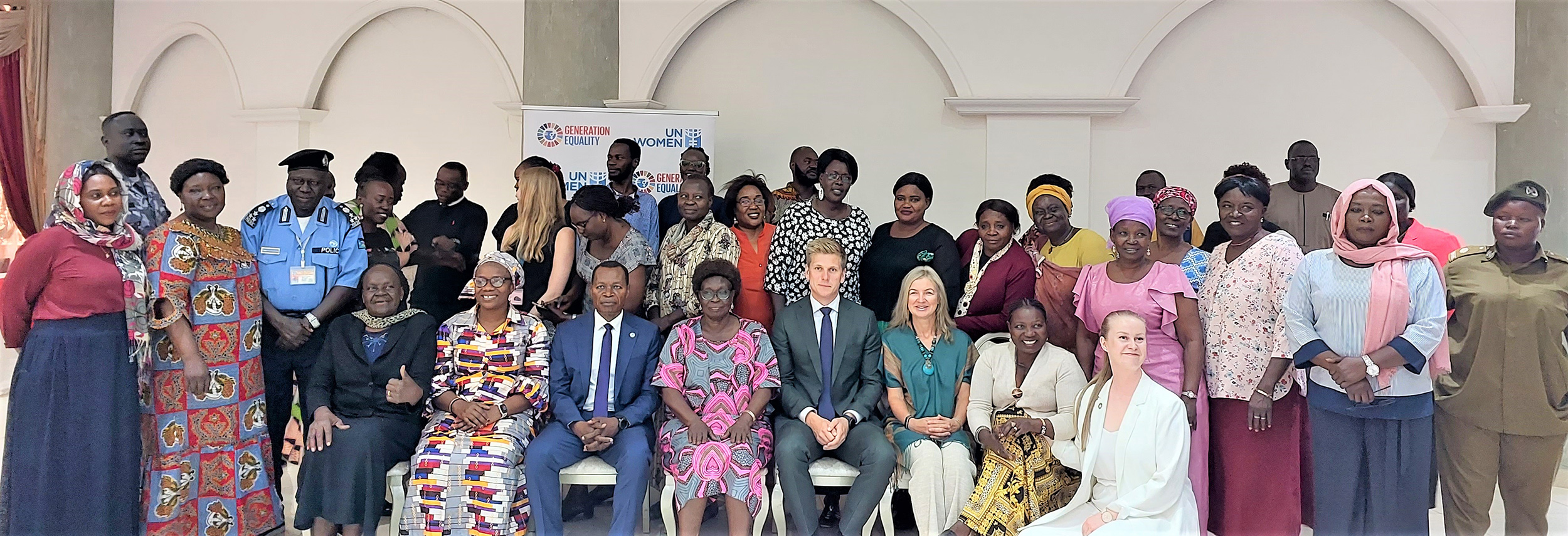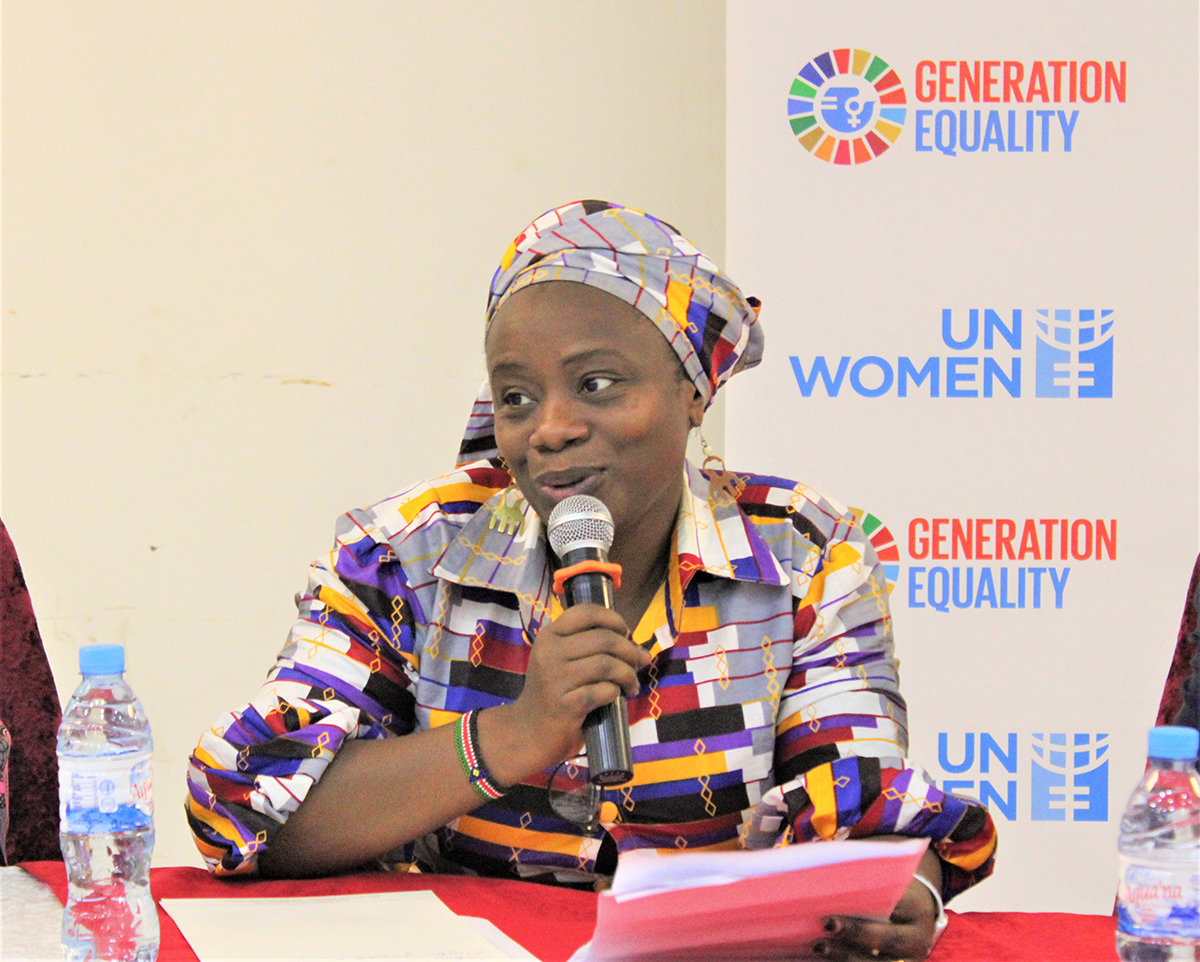“The WPS agenda in South Sudan could not be timelier” – South Sudan begins the development of its second National Action Plan on the UN Security Council Resolution 1325 on Women, Peace, and Security
The Government of South Sudan, under the leadership of the Ministry of Gender, Child and Social Welfare and with support from UN Women, is in a process of developing its second National Action Plan on the UN Security Council Resolution 1325 on Women, Peace and Security (WPS) for 2023-2027 in South Sudan. As the National Action Plan captures timely issues across the society with its four pillars of prevention, participation, protection, and relief and recovery, the new “SSNAP” represents a country-wide interest and effort. Consultations with a variety of stakeholders are ongoing at the national and state levels, and the new Plan is expected to be launched during the 16 Days of Activism against Gender-Based Violence campaign later in 2022.
Date:

“If there is no peace, women are the ones suffering,” said Hon. Joseph Bangasi Bakosoro, Minister of Public Service of South Sudan at the national-level consultation for South Sudan’s second National Action Plan (SSNAP) on Women, Peace, and Security (WPS) on August 31st, 2022 in Juba, South Sudan. Organized by the Ministry of Gender, Child and Social Welfare with UN Women’s support, the consultation gathered government representatives, civil society actors, security sector officials, and development partner representatives at the national level to discuss how the SSNAP can protect women and girls in situations of armed conflicts, safeguard their human rights, prevent violence, and ensure women’s equal participation in peace negotiations and reconstruction efforts in South Sudan.
The new SSNAP is built on the progress made and lessons learned from South Sudan’s first-generation National Action Plan on WPS 2015-2020. Sound progress was made in the implementation of the first SSNAP. One of the main achievements was women’s participation as negotiators and observers in South Sudan’s peace negotiations which led to the signing of the Revitalized Peace Agreement on the Resolution of the Conflict in South Sudan (R-ARCSS) in 2018. South Sudanese women made up 25 percent of the official delegates and members of the Women’s Coalition.
“Women’s participation in the peace negotiations came with a significant achievement: the affirmative action quota, which ensures women’s political participation and representation at all levels of society, was increased from 25 percent to 35 percent. For the first time, South Sudanese women also gained a signatory status to the peace agreement and achieved a key role in the implementation mechanisms”, highlighted Rukaya Mohammed, Acting Deputy Country Representative, UN Women South Sudan.

The new SSNAP aims at addressing lessons learned from the first-generation SSNAP. The four pillars and some of the strategic goals will be carried over to the new SSNAP, while adequate financial resources for the implementation as well as strengthening the national institution’s ownership and capacity to implement the SSNAP will be addressed. One of the main goals is also to localize the new National Action Plan in South Sudan’s States. Many of the lessons learned are highlighted in the progress report of the first-generation SSNAP, published in December 2021.
A variety of stakeholders are consulted to ensure that the new SSNAP reflects the current context, needs, and priorities of South Sudanese women and girls, and the society at large. The Government, civil society actors, youth, people with disabilities, development partners, and the media are engaged in the process both at the national and local levels.
“The WPS agenda in South Sudan could not be timelier and more relevant given the continued transitional period for the Revitalized Peace Agreement, and its overall aim in bringing sustainable peace, security, and reconciliation for the benefit of South Sudanese women, girls, boys, and men. The roadmap for the transitional period along with its benchmarks, such as the unification of armed forces, permanent constitution, and democratic elections, all necessitate women’s full and equal participation alongside men”, said Ms. Mohammed.
The UN Security Council Resolution 1325 on Women, Peace, and Security was unanimously adopted by the UN Security Council in October 2000. It stresses the importance of equal participation and full involvement of women in all efforts to maintain and promote peace and security. It is accompanied by nine subsequent resolutions ever since, a framework of ten resolutions that are a testimony to the importance of women as peacemakers and conflict-mediators. National Action Plans on Women, Peace, and Security are a means of bringing the global normative frameworks into a national context and concrete action.